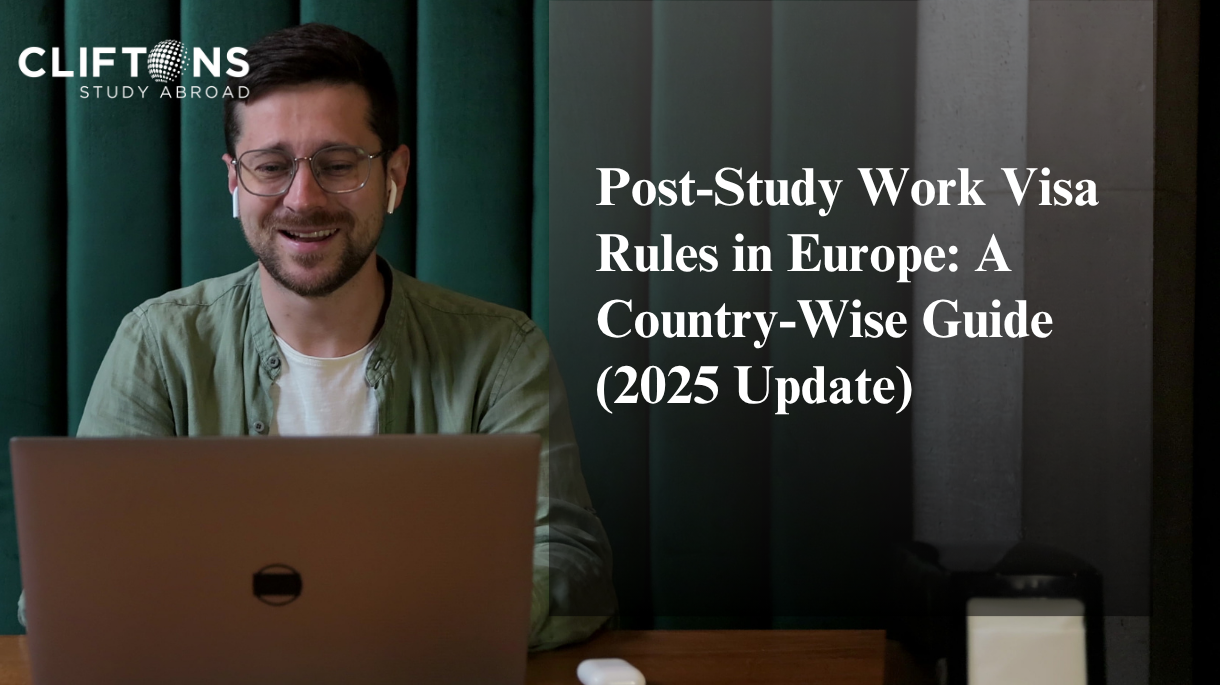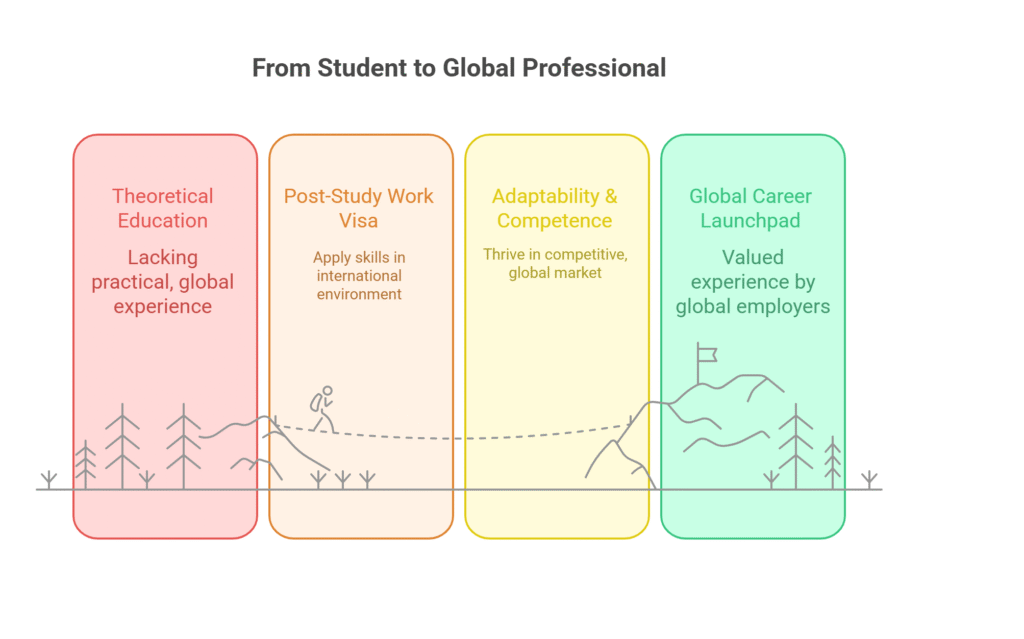
For an ambitious Indian student, the dream of studying abroad isn’t just about earning a degree—it’s about launching a global career. The diploma is the key, but the post-study work visa is the door that opens up a world of professional opportunities. It is the crucial bridge between being a student and becoming a sought-after international professional. This period of post-graduation employment is where you gain invaluable experience, build a global network, and truly maximize the return on your educational investment.
Europe has firmly established itself as a top destination for Indian students, and its welcoming post-study work policies are a major reason why. Understanding these rules is not just an afterthought; it’s a critical part of your planning from day one. At Clifton Study Abroad Consultancy, we believe that a successful international career begins with a smart, long-term strategy. As leading study abroad consultants, we help you look beyond admissions to the career that awaits you. This guide will provide a clear, country-wise breakdown of the post-study work visa Europe 2025 rules, so you can plan your future with confidence.
Why Post-Study Work Visas Matter for International Students
How post-study work opportunities shape global careers
A post-study work visa transforms your education from a theoretical exercise into a practical career launchpad. It allows you to apply the skills you’ve learned in a real-world, international environment. This experience is highly valued by employers globally, whether you choose to stay in Europe or return to India. It demonstrates adaptability, cross-cultural competence, and the ability to thrive in a competitive market.
Europe’s growing popularity among Indian students
Students are increasingly looking beyond traditional destinations, and Europe’s blend of high-quality, affordable education and strong career outcomes is a winning combination. Countries like the UK, Germany, and Ireland are not just home to world-class universities; they are also thriving economic hubs actively seeking skilled graduates to fill key roles in their industries.

How Clifton Study Abroad Consultancy helps students plan ahead for visa transitions
Choosing the right course in the right country is directly linked to your post-study options. A knowledgeable study abroad counsellor from Clifton helps you make this strategic choice from the very beginning. We ensure the course and university you select are eligible for post-study work rights, providing you with a clear and secure path from student to professional. As a premier abroad education consultancy, our guidance is designed to safeguard your future.
Country-Wise Post-Study Work Visa Details (2025 Update)
Navigating the various visa rules can be complex. Here is a clear, country-by-country breakdown of the policies in Europe’s most popular study destinations that we specialize in.
United Kingdom (UK) – Graduate Route (2 Years)
The UK’s Graduate Route visa is one of the most attractive and straightforward post-study work options in the world.
- Duration: Graduates with a Bachelor’s or Master’s degree can stay and work for two years. PhD graduates are eligible for three years.
- Key Advantage: The most significant benefit is that you do not need a job offer to apply. This gives you complete freedom and flexibility to search for the perfect role after you graduate. You must apply from within the UK before your student visa expires.
- What You Can Do: You can work in almost any job at any skill level, including self-employment. This allows you to gain diverse experience, save money, or even try different roles before settling on a long-term career path. The ultimate goal for many is to secure a role with a licensed employer who can sponsor them for a Skilled Worker Visa, which is the pathway to long-term settlement.
- The Clifton Edge: As a leading consultancy for study abroad, we ensure your initial student visa application is flawless, setting you up for a smooth transition to the Graduate Route. We also advise on courses in sectors with a high number of sponsoring employers, improving your long-term prospects.
Germany – 18-Month Job-Seeking Visa for Graduates
Germany, Europe’s economic engine, is highly invested in retaining skilled international graduates.
- Duration: After graduating from a German university, you can apply for a residence permit that allows you to stay in the country for 18 months to look for a job.
- Key Requirement: The job you find must be related to your field of study. This is a key difference from the UK system and highlights the importance of choosing a course with strong local demand, particularly in engineering, IT, and science.
- What You Can Do: During these 18 months, you have unrestricted access to the job market and can work any job to support yourself while you search for a qualified position. Once you find a suitable role, you can apply for a German work permit or, for highly qualified individuals with a sufficient salary, the prestigious EU Blue Card, which offers a faster track to permanent residency.
- The Clifton Edge: Our expert study in Europe consultants guide you towards courses in Germany’s high-demand sectors, maximizing your chances of finding a qualifying job and potentially securing an EU Blue Card within the 18-month window.
France – 12-Month Temporary Residence Permit
France offers excellent opportunities, particularly for students who have completed a Master’s degree.
- Duration: Students who have earned a Master’s degree or equivalent can apply for a one-year, non-renewable Temporary Residence Permit (APS – Autorisation Provisoire de Séjour) to search for a job.
- Key Advantage: This visa allows you to work in any job for up to 60% of the legal work week while you search for a full-time position related to your studies. If you secure a contract that pays at least 1.5 times the minimum wage, you can then apply for a relevant work permit without leaving France. For certain high-achievers, the “Talent Passport” scheme can also be an option.
- The Clifton Edge: French administrative processes can be complex. As an experienced European student visa agency, Clifton guides you through the initial visa process, ensuring all your paperwork is in order for a smoother transition to the APS after graduation.
Ireland – Stay Back Option for 12Months–24 Months
Known as the “Silicon Valley of Europe,” Ireland offers fantastic career prospects for graduates in its booming tech, pharmaceutical, and business sectors.
- Duration: The Third Level Graduate Scheme (Stamp 1G) allows graduates of Bachelor’s programs (Level 8) to stay for 12 months. Graduates with a Master’s or PhD degree (Level 9 or 10) can stay for a generous 24 months.
- Key Advantage: The two-year stay for Master’s graduates provides a significant amount of time to secure a role. Furthermore, Ireland’s Critical Skills Occupations List includes hundreds of in-demand roles in sectors like ICT, engineering, finance, and healthcare. Securing a job from this list offers a fast-track pathway to a work permit and long-term residency (Stamp 4).
- The Clifton Edge: A study abroad counsellor at Clifton can highlight how pursuing a Master’s degree in Ireland not only provides advanced knowledge but also doubles your post-study stay, a crucial strategic advantage. We specialize in identifying courses that align with the Critical Skills list to enhance your long-term settlement prospects.
Eligibility Criteria and Documentation
While rules vary slightly, there are common eligibility criteria for most European post-study work visas.
- Recognized Degree: You must have successfully completed a degree (usually Bachelor’s, Master’s, or PhD) from an accredited and recognized university in that country.
- Valid Student Permit: You must hold a valid student residence permit at the time of your application. You cannot apply for a post-study visa after your student permit has expired.
- Financial Proof: Some countries may require you to prove that you can financially support yourself during the job-seeking period.
- Application within the Country: In almost all cases, you must apply for the post-study work visa from within the country where you studied, before your student visa expires.
How Clifton Study Abroad Consultancy Simplifies Post-Study Transitions
Navigating the transition from a student visa to a post-study work permit can be a source of anxiety. This is where Clifton’s expertise makes the process hassle-free. Our role as your overseas education consultants extends far beyond university admissions.
Personalized guidance on visa extensions
Our support doesn’t end when you get your acceptance letter. We provide you with a clear roadmap of what to expect after graduation. Our team of expert Europe study visa consultants offers personalized guidance on the specific requirements, documentation, and timelines for applying for your post-study work visa, ensuring you are prepared well in advance.
Ties with universities and Europe-based immigration experts
Clifton Study Abroad Consultancy has built a strong network. We maintain ties with university career services and Europe-based immigration experts who can provide the most current and accurate advice. This network is an invaluable resource for our students as they navigate their career journey abroad.
Step-by-step assistance from study to stay-back permits
We see your journey as a whole. From helping you choose a course that qualifies for a stay-back option to guiding you through the final application, we provide end-to-end support. Our goal as a leading global abroad consultancy is to empower you to achieve your long-term career ambitions with confidence.
Conclusion
The opportunity to work in Europe after graduation is a game-changer. It can launch your career, provide you with invaluable international experience, and offer a significant return on your educational investment. As this guide shows, the post-study work visa Europe 2025 landscape is full of opportunities, but success lies in understanding the rules and planning ahead.
This is why early planning with Clifton Study Abroad Consultancy is so crucial. We help you build a comprehensive strategy from the very start, aligning your academic choices with your long-term career goals and the specific visa regulations of your chosen country. With our expert guidance, you can ensure a smooth transition from student to successful global professional, unlocking your full potential for career growth in Europe.
FAQs
How long can international students stay in the UK after graduation?
In 2025, graduates with a Bachelor’s or Master’s degree can stay for two years on the Graduate Route visa. Those who complete a PhD are eligible to stay for three years.
What are Germany’s post-study visa rules in 2025?
Germany offers a generous 18-month residence permit for international graduates to search for a job. The job found must be related to the field of study.
Can France graduates switch to work permits easily?
Yes, the process is streamlined. After completing a Master’s degree, graduates can get a one-year temporary residence permit (APS) to find work. If they secure a job contract that meets certain salary requirements, they can then apply for a relevant work permit.
Which European country offers the best post-study stay option?
This depends on your goals. The UK offers the most flexibility as no job offer is required. Ireland offers a longer duration (24 months) for Master’s graduates, which is a great advantage. Germany provides a long search period in a very strong economy. A study abroad counsellor from Clifton can help you decide which option is best for your specific career path.


One reply on “Post-Study Work Visa Rules in Europe: A Country-Wise Guide (2025 Update)”
Vanshika Khandelwal October 31, 2025 at 12:10 am
The University of Sunderland acceptance rate reflects the university’s inclusive approach toward international applicants. With a moderate acceptance rate, it offers students from around the world an excellent opportunity to pursue quality education in the UK. Meeting academic and English proficiency requirements can significantly improve your chances of securing admission.